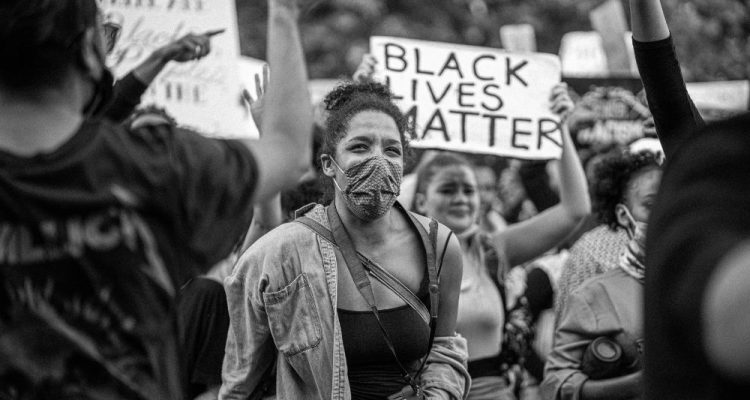Editor’s Note: This article begins with a description of racialized violence that may upset some readers.
I watched the video of George Floyd’s murder from the comfort of my cozy living room. I cried as he went from begging, to saying he couldn’t breathe, to crying, to calling for his mother. To gasping for air. To silence. For a few weeks, the outrage over his murder became the loudest noise, even in my evangelical community, where vocalized compassion is oftentimes reserved for babies in the womb. But over time that compassion dwindled, as compassion usually does. At first, white people like me were shocked, grieved, and motivated. Soon, however, those emotions faded into the background, and we returned to the way we lived before.
This is how our hearts typically respond when we witness injustice or oppression. It is like climbing up the descending steps of an escalator. One of the first escalators I encountered was in a secluded corner of an enormous mall. I spent ten minutes trying to conquer those moving metal slats. I ran and ran, stuck midway up the staircase, until I finally grew tired and sat down, letting the steps carry me back to the bottom where I started. When we encounter other people’s pain, we start running. We run out of love. But after a while, we begin to feel the strain of emotional exhaustion, and midway up that staircase, we stall. It’s too hard. And it’s not our fight anyway, right? It is so much easier to survive our own days if we forget, ignore, or discredit the suffering of those around us. So eventually, we sit back down and coast away from the weight of other people’s sorrow. This has been my experience, at least. Especially as it relates to racism. My compassion may burn brightly at the start, but it never lingers long term if I am simply drifting along on a wave of emotion. That drift will always bring me back to my own cares and concerns — never to the cares and concerns of others.
About a year after George Floyd’s murder, I read an article that recommended documenting one’s interactions with people of other races. The author talked about how we often cannot even see our own prejudice until we make the intentional effort to look. I didn’t think I’d see anything new, really. I wasn’t racist. I cared about everyone, equally. But I wanted to be open. So, I labeled the top of a blank page in my journal “RACISM IN ME?” And I waited.
A couple days later, I was standing in front of the hot dog display at my local grocery store, trying to remember which brand was my favorite. An elderly black man walked up beside me. I turned to him and smiled. He smiled back. He browsed the hot dog selection for a second, then stepped past me to grab a pack. I immediately felt a flash of annoyance. What was that? I put the hot dog search on hold and looked at the man as he walked away. Why was I annoyed? Two white people had reached in front of me before him and I hadn’t given them a second thought. I replayed the moment in my mind, trying to get to the bottom of my own feelings. In shock, I realized that my first thought had been, How dare he?
I almost burst into tears in the middle of the meats aisle, overwhelmed by shame and disbelief. But maybe it wasn’t about race? I pictured a different scenario where that sweet elderly man came up beside me and said, “Excuse me,” before walking into the space between me and the processed meat. I would have gladly let him go first. I stopped. I would have “let him” go first? I looked around. I was standing at least four feet back from the display, specifically so other people could get what they needed without me being in the way. The two white people before him hadn’t excused themselves. I hadn’t wanted to give them permission to step in front of my indecisive self. I had barely even noticed them. But for some reason, I felt this teetering old man with brown skin owed me his deference. I was horrified.
Another year has gone by since that day in the grocery store. I am certain that had I not been intentionally documenting my responses to people of other races, I would have dismissed that flash of frustration as random impatience or a generalized bad mood. And yet, despite a handful of similar experiences, I stopped keeping that journal. Despite a conviction to be more like the Christ I claim to follow and the sense that the most rotten parts of me would only change if I could see them, I stopped looking. I stopped because it was upsetting, and it was hard. I stopped because my comfort and convenience were a higher priority for me than that man in the grocery store. I really did care. Just not enough to do the work to change.
We all have work to do, in the space around us and in ourselves. Even our subconscious thoughts need sanctification. We cannot change the whole world, but we can listen. We can look. And we can love. We can climb that escalator with humility and intention and let the pain of those around us break away at the edges of our hearts, over and over again.

